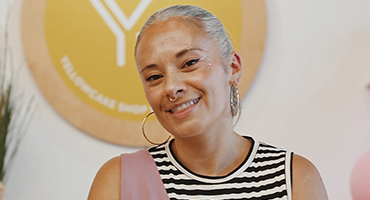Cleveland-based Yellowcake Shop is more than just a clothing brand. It’s more than a retail store. Founder Valerie Mayén views it as a way to “embolden” women to take on challenges and rise to their potential.
Yellowcake Shop got its start in 2009. Today, the brand has a brick-and-mortar location and offers stylist services and custom designs for clients, in addition to its variety of apparel.
Mayén had always wanted to go into fashion, but she wasn’t trained in the techniques. She went to art school, but for painting and illustrating, not fashion design.
She had the experience, though. Growing up in what she described as a “lower income, Latin-American family,” she didn’t have the money to buy the name brands many of her classmates were wearing in the ’80s and ’90s. So, she found ways on her own to make the clothes she could afford.
“Grunge was in, and so I was like, cutting things and ripping them and painting them, and then people started really liking the stuff that I was making,” Mayén says. “And that’s when I really felt, I didn’t care anymore about fitting in. I cared about standing out. I cared about making my own way and expressing who I was through the clothes that I could make and the things that I could do for myself.”
As an adult working multiple jobs, she continued combining and altering clothes to create her own style, and she regretted having to tell people she couldn’t make them a piece, too. So, she decided to learn.
Mayén took some classes at Virginia Marti College and taught herself the rest of the skills she needed “through books and trial and error.”
“I loved it so much that I couldn’t wait to get home from all my other jobs so I could practice my sewing,” she says.
Underdog story
Mayén started putting her creations on Etsy in 2009 and, in 2010, appeared on the design competition TV show Project Runway. She spent the bus ride to her filmed audition hand-sewing coats — her design focus at the time — because she had sold out of her inventory shortly before it was scheduled. She didn’t win her season, but as part of the show, Mayén had the chance to show a collection at New York Fashion Week.
“That’s usually an experience that costs most designers tens, if not hundreds, of thousands of dollars to put on,” she says.
When Mayén started Yellowcake Shop, she knew she didn’t want to do fast fashion, which churns out clothes in big quantities with little regard to the environment. She wanted to take her time crafting special pieces that customers could enjoy. Yellow cake is often the “underdog of sweets,” Mayén says, the quiet dessert absent from most menus. The name was a metaphor for who Mayén wanted to serve, the people who may be overlooked or mis-served by fast fashion.
Today, Yellowcake Shop has three full-time employees in Cleveland and about five sewists the company works with on a contract basis. Mayén is still the primary designer of everything made for the company, though the brand’s studio manager recently assisted in designing a line of plus-size items. Mayén looks to improve on staples and trends and listens to customer feedback. Pockets, comfortable fabric and all-season, versatile designs are often winners.
Empowering others
Mayén’s learned a lot in the years she’s run Yellowcake Shop, and she wants to share her experience with others going forward.
“It’s important to recognize, just because I’m a woman, just because I’m a creative business, just because my education isn’t Ivy League, doesn’t make it any less valuable … ” Mayén says. “My goal is to really educate other women, especially women of color, on how they can level up their businesses and avoid the mistakes that I made, so that they can be millionaires sooner, so that they can be financially independent and wealthy sooner, so that they can also bring other people up with them. Because that’s really my goal at the end of the day. Yeah, we make clothes, but our main goal is to manufacture confidence and to help women unlock potential they didn’t even know they had, the same way that I felt that same unlocking when I was in junior high and I started making my own clothes. When women wear our clothes, it’s not just so that they can look nice and polished and impress someone at the office or impress whoever at the conference they’re speaking at.”
It’s about how those clothes make customers feel. She recalled one customer telling her that, every time she wore one of their cardigans, she negotiated higher for herself. And that’s what it’s all about, Mayén says.
“We embolden them. We help them unlock what’s already inside them, that they didn’t realize they could unlock,” Mayén says. “That’s what clothing can do sometimes.”

